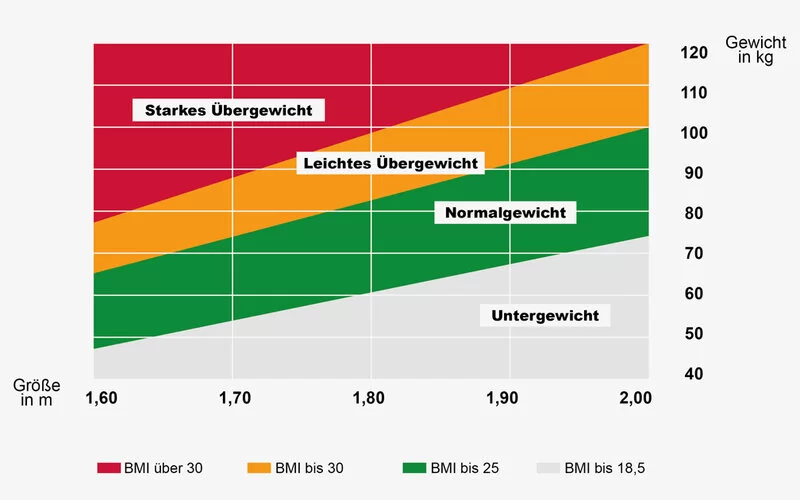Many diets – from Atkins to low carb to the Stone Age Paleo diet – promise rapid weight loss in a short time. A healthy diet and plenty of exercise helps you lose weight in the long term.

BMI: What body weight is healthy?
Whether the current body weight is still healthy can be determined using a certain metric, the so-called body mass index (BMI). It applies to adults from around the age of 18 and determines the ratio of body weight to height. If you work or train hard physically, as bodybuilders or heavy workers do, for example, it is best to seek advice from a doctor or nutritionist regarding weight loss. For everyone else, the BMI is suitable. It can be calculated as follows:
Body weight in kg : (height in m)²
Alternatively, the Federal Centre for Health Education (BzgA) offers a BMI Calculator free of charge on their website.

- Grey: Their weight is very low, they should not lose any more weight under any circumstances.
- Green: Great! Their weight is within the normal range.
- Yellow: They are slightly to moderately overweight. From a health point of view, this is not yet a concern if your blood values and blood pressure are okay. Be careful not to gain any more weight. Losing a few kilos is recommended from a health point of view.
- Red: Their body weight is well above their normal weight. It would be good for your health if you tried to lose weight, because you have a higher risk of diseases such as high blood pressure, diabetes or even a Stroke. Talk to your doctor about how to reduce your weight in a healthy way in the long term.
Not recommended: A flash diet
Especially around the turn of the year, they are literally on everyone’s lips again: flash diets. They promise a high weight loss in a short time, but can easily lead to malnutrition due to their one-sidedness. These include, in particular, monodiets in which one food is in the foreground. Some trend diets also have their pitfalls. They often contain strict rules that do not take into account individual preferences and lifestyles.
Diets that are not recommended therefore include, for example, diets with a food such as the potato, egg or cabbage soup diet. They are too one-sided and not suitable in the long run.
Short-term diets also rarely have a lasting effect. Characteristic of diets is that those who want to lose weight lose a lot of weight quickly. After the diet, however, they gain weight just as quickly, sometimes even more than they had lost, as soon as they fall back into old eating habits (so-called yo-yo effect).

10 tips for losing weight with the right diet
The DGE recommends long-term weight loss, which is based on a combination of a change in diet, behavior change and an increase in physical activity. A wholesome diet and 30 to 60 minutes of exercise per day help to regulate weight. With these 10 rules you can do something good for yourself and your body:
1. Eat a varied diet
Combine all food groups, i.e. plant and animal foods as well as fats. Plant-based foods in particular have few calories, but are bursting with vitamins, minerals and satiating nutrients Fiber.
2. 5 times a day fruits and vegetables
The vitamins, minerals and satiating fibre contained in fruit and vegetables will give you energy for the day. By the way, this also includes legumes such as lentils, chickpeas, beans and unsalted nuts. The DGE recommends: at least 3 servings of vegetables and 2 servings of fruit per day.
3. Whole grain instead of white flour
Pasta, bread and the like made from whole grains provide you with healthy nutrients, keep you full for a long time and reduce the risk of many diseases such as type 2 diabetes mellitus or colon cancer. Potatoes are also a healthy source of carbohydrates.
https://www.youtube-nocookie.com/embed/3fpEVrKLmeU?enablejsapi=1Nutrition coach and doctor Doc Felix shows three nutrition tips to lose weight healthily and in the long term.
4. Animal foods in moderation
Daily milk and dairy products supply the body with valuable calcium. You can eat fish once or twice a week. Enjoy meat and sausage rarely. Between 300 and 600 grams per week are ideal. Eggs are allowed, but also in moderation, so they should not be on the menu every day.
5. Fat is important
But please mainly vegetable oils from, for example, rapeseed, walnut, soy or olives. In addition, prefer vegetable spreadable fats instead of butter. Fats such as coconut oil, palm oil or palm kernel oil can have an unfavourable effect on health.6. Less sugar and salt
Sugar is mainly found in processed foods and sweet drinks of all kinds. It is therefore best to cook fresh and drink plenty of unsweetened drinks such as water and tea. This will save you calories and reduce your risk of obesity, type 2 diabetes mellitus and tooth decay.
Salt in high amounts increases the risk of high blood pressure and cardiovascular disease. It is often found in foods such as sausage, bread, cheese and especially processed foods. Try to cook with a little salt and not add salt at the table. This makes the individual foods taste much more natural.
7. Drink, drink, drink – and do the right thing
1.5 liters of water or unsweetened teas quench thirst and leave blood sugar untouched. Cravings don’t stand a chance. If you need taste, you can mix juice spritzers with a ratio of 3 parts water to one part juice. Avoid sugary foods and alcohol.
8. It’s all about the preparation
To conserve nutrients and save fat, steaming and steaming food is particularly suitable. The rule is: as long as necessary and as short as possible. However, meat and fish should always be cooked through to avoid foodborne infections.
9. Take your time
If you enjoy your food and eat slowly, you get more out of it. This is because the feeling of satiety only sets in after about 15 to 20 minutes. This way, you never eat too much and even support your digestion with thorough, slow chewing.
10. Exercise is the be-all and end-all
In addition to a balanced, healthy diet, body weight can be controlled through regular exercise. Incidentally, this also includes everyday activities such as cycling and climbing stairs.
About 30 to 60 minutes of moderate physical activity a day is recommended. If you exercise, you automatically increase calorie consumption and the muscles you build burn calories even while you sleep. In addition, regular exercise reduces the risk of many diseases, such as cancer, type 2 diabetes mellitus, high blood pressure, stroke or osteoporosis.
